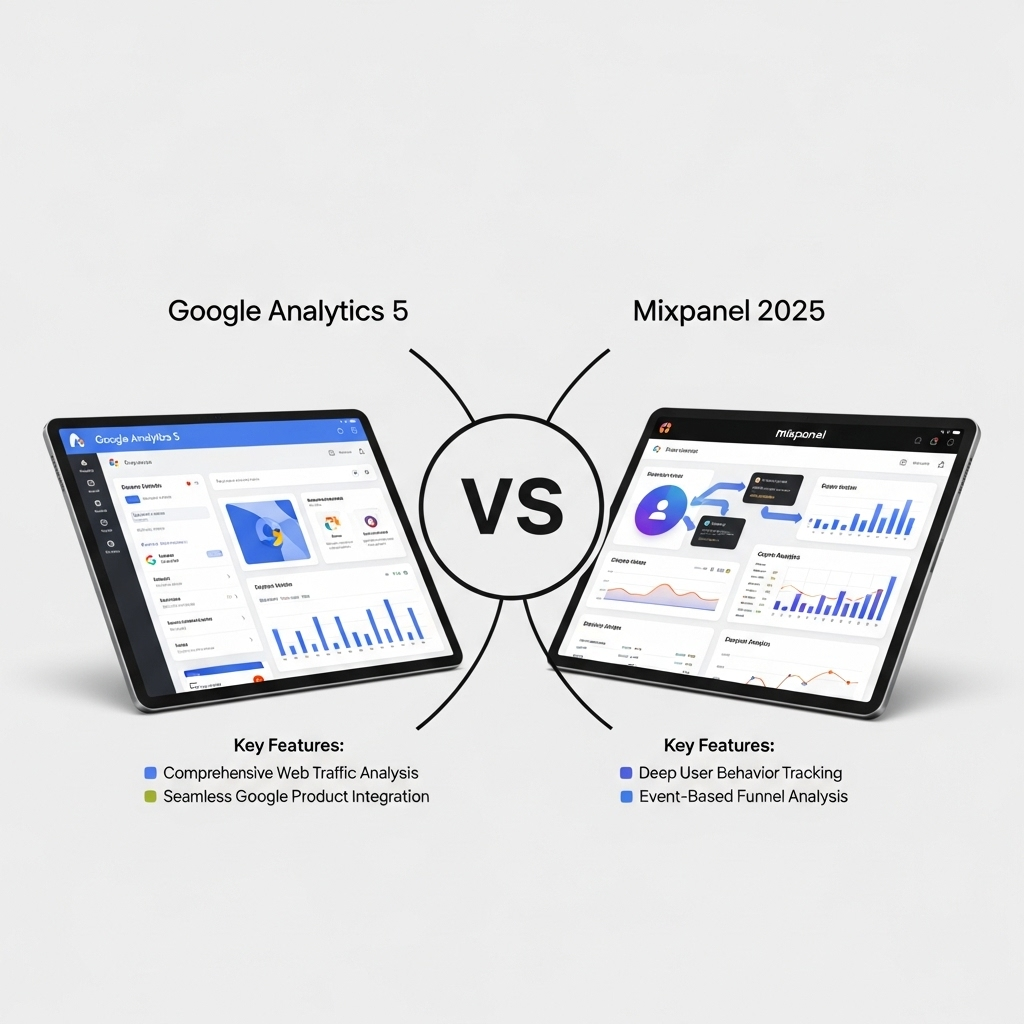Analytics tools: Google Analytics 5 vs. Mixpanel 2025
Choosing between Google Analytics and Mixpanel depends on your analytics maturity and business focus. Google Analytics excels at broad website traffic analysis, while Mixpanel specializes in user behavior within your product.
This comparison analyzes real-world performance, user feedback, and key differentiators to help you make an informed decision.
Quick Verdict
For organizations prioritizing cost-effectiveness and broad website analytics, Google Analytics is a solid choice. If you need advanced user-level tracking and are willing to invest, Mixpanel offers more granular insights.
- Google Analytics offers a free entry point with robust features, ideal for businesses starting with web analytics.
- Mixpanel provides deeper user-level insights and segmentation, suitable for product-led companies focused on user behavior.
- Mixpanel's pricing can quickly escalate, making Google Analytics a more predictable option for budget-conscious users.
Who Should Choose Which?
Choose Google Analytics 5 if:
Businesses seeking a free, comprehensive web analytics platform with integrations across the Google ecosystem.
Choose Mixpanel 2025 if:
Product-focused companies needing detailed user behavior insights and advanced segmentation capabilities.

Key features – Side-by-Side
| Attribute | Google Analytics 5 | Mixpanel 2025 |
|---|---|---|
| Data Collection Methods | JavaScript/HTML tags, triggered by events like page views, collecting user counts, session data, geolocation, and device info. | Client-side, server-side, and hybrid tracking via SDKs and APIs for web, mobile, and server-side applications. |
| Real-time Reporting | Displays events and usage data from the present to 30 minutes ago (60 for GA360), showing active users, locations, and content. | Processes data in real-time, offering up-to-date insights through customizable dashboards. |
| Customizable Dashboards | Allows custom dashboards with widgets for specific metrics and visualizations like charts, tables, and maps. | Offers customizable dashboards to visualize key metrics and drill down into specific segments. |
| User Segmentation Capabilities | Enhanced segmentation for analyzing subsets of users, sessions, or events based on characteristics, behaviors, or events triggered. | Unlimited segmentation on attributes, user properties, and cohorts, enabling complex user segments with combined attributes, events, and properties. |
| Funnel Analysis | Tracks user steps to complete goals, revealing drop-off points to identify areas for improvement. | Calculates conversion rates between steps, overall completion rate, median time to convert, and drop-off events/segments. |
| A/B Testing Integration | Integrates with Google Optimize to analyze the impact of A/B tests on website performance. | Integrates with A/B testing tools like AB Tasty, Kameleoon, VWO, Optimizely, and Taplytics. |
| Attribution Modeling | Uses attribution models to assign credit for conversions to different marketing touchpoints. | Offers attribution modeling with models like First Touch, Last Touch, Linear, Participation, and Time-Decay. |
| Pricing Model | Free web analytics service, with potential costs for implementation, consulting, and training. | Usage-based pricing with Free, Growth, and Enterprise plans. |
| Customer Support Availability | Built-in technical support leveraging Google's infrastructure. | Customer service has been criticized. |
Overall Comparison
Pros and Cons
Google Analytics 5
- Offers complete customization of the Google Analytics experience.
- User ID feature allows you to link a website visitor's behavior across different devices and multiple sessions.
- Offers default and custom attribution models.
- Offers various data visualization options.
- Integrates with various marketing automation platforms, CRM systems, and other tools.
- Offers built-in technical support and leverages Google's infrastructure.
- Reliance on data sampling and cookies can compromise data quality.
Mixpanel 2025
- Easy-to-navigate user interface.
- Unlimited segmentation capabilities on attributes, user properties, and cohorts.
- Works cross-platform, so you can see the same user's activity stream across both website and mobile applications.
- Customizable data parameters for precise user behavior insights, enabling behavioral segmentation for targeted campaigns.
- Mixpanel has been criticized for its poor customer service.
- Pricing can be expensive, especially for small businesses.
User Experiences and Feedback
Google Analytics 5
- GA4 offers enhanced segmentation capabilities.
- Analyzing funnels in Google Analytics helps identify where users abandon the conversion process.
- Google Optimize integrates seamlessly with Google Analytics.
- No major complaints reported.
- No value feedback reported.
Mixpanel 2025
- No highlights reported.
- No major complaints reported.
- No value feedback reported.
Frequently Asked Questions
Is Google Analytics really free?
Yes, the standard version is free, but advanced features and support might require a paid Google Analytics 360 subscription.
Which platform is easier to set up?
Google Analytics generally has a simpler initial setup, but both platforms require technical expertise for advanced configurations.
Sources & Citations
- Official product specifications
- Expert reviews from tech publications
- User feedback from online forums
Information gathered through AI-assisted web search and analysis. Last updated: August 2025
Methodology & Transparency
Our comparison methodology combines multiple data sources to provide comprehensive, unbiased analysis:
- Data Collection: We gather information from official specifications, user reviews, and independent testing
- AI-Assisted Analysis: Advanced AI helps process large amounts of data while maintaining accuracy
- Human Oversight: All comparisons are reviewed for accuracy and relevance
- Regular Updates: Content is refreshed to reflect new information and user feedback
- Bias Mitigation: We strive for objectivity by considering multiple perspectives and sources
Versusly.ai uses AI-assisted content generation combined with human oversight to deliver comprehensive comparisons. We are transparent about our process and continuously work to improve accuracy and usefulness.